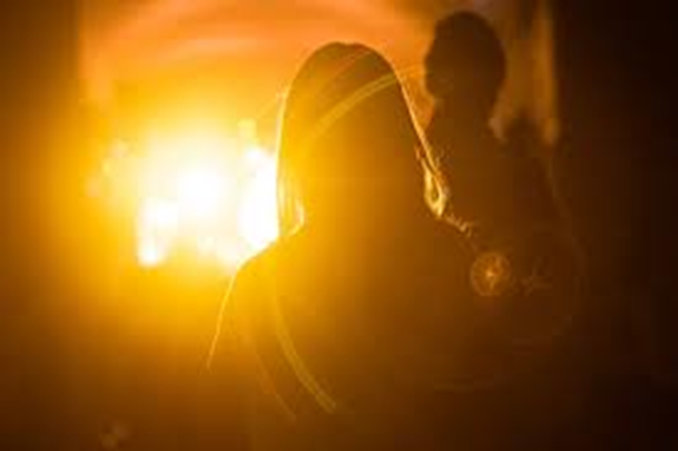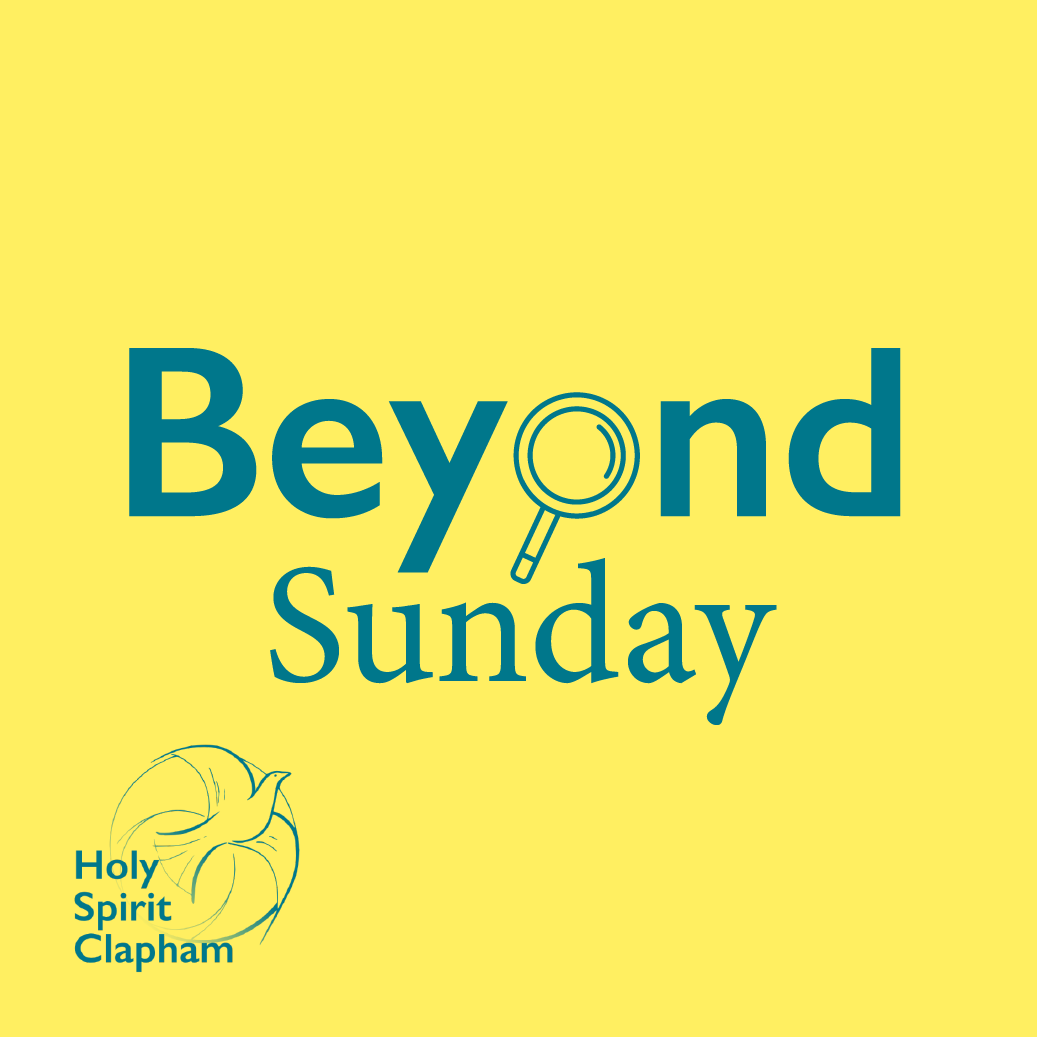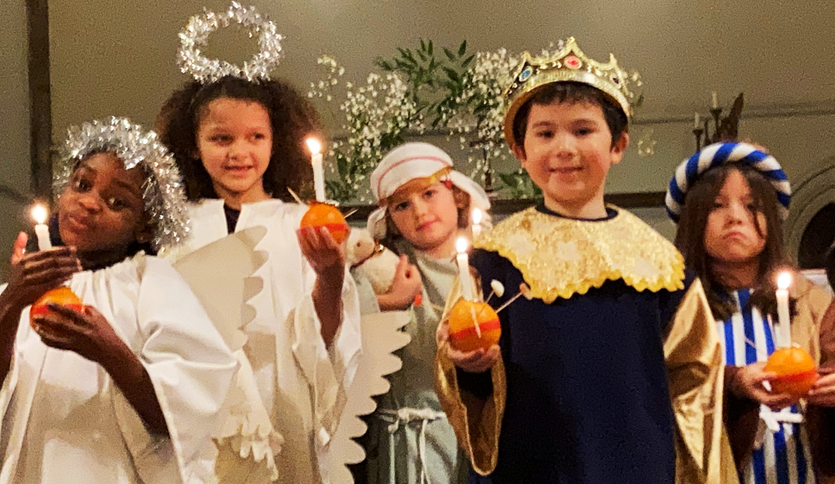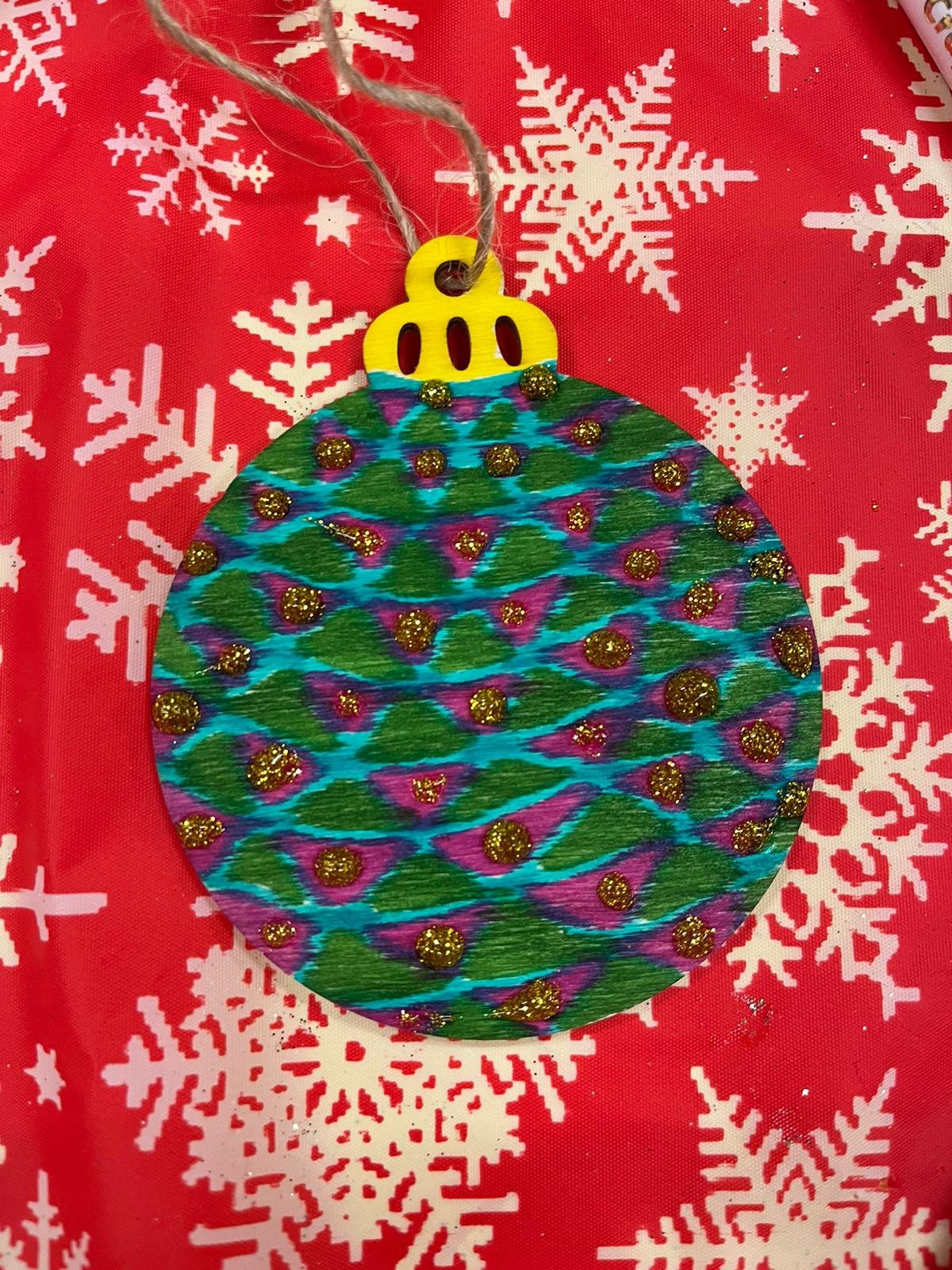
Second Sunday of Lent
Throughout Lent our Old Testament readings recall the covenants, binding promises, God made with God’s people. This week, Genesis 17:1-7, 15-16, recounts the promise to Abraham. This promise had been made to Abraham before but he had failed to believe it. Similarly, in Mark 8:31-38, Peter fails to believe Jesus. It is heartening that our scriptural heroes doubt as much as we do but that God is persistent. Peter does not doubt that Jesus is divine, is just that his idea of a Messiah is informed by the world in which he lives: a saviour is someone who will gain the whole world for his people. Jesus, however, is insistent that he will suffer and die, that the fulfilment of God’s promise will not be an easy path. Yet we need to hold onto these promises if they are to become our reality. Abram is renamed by God in this week’s reading, becoming Abraham, meaning the Father of nations. A name which must have made him acutely aware of the difference between his present childless state and the future that God promised. In a week which saw the death of Alexei Navalny his supporters are acutely aware of the difference between their present reality and the future Russia that Navalny dreamed of. During Lent we are called to reflect, with sorrow, on all the ways in which our world does not conform to the kingdom of God. At the same time, we are asked to hold onto the possibility of a better, different world. A world which may seem foolish to some, just as it was foolish for 99 year old Abraham to believe that he would father nations and for Peter to believe that healing and renewal would come from the cross. Jesus asks us to risk being fools, to keep our minds on the possibilities of the divine so that kingdom may come on earth as it is in heaven.

First Sunday of Lent
Lent, 40 days of penitence and reflection, can appear dull: no flowers, no Gloria, no chocolate. Yet our readings today are action packed: in Genesis 9:8-17, Noah is in a storm-tossed boat packed with wild beasts for 40 days; and, in Mark 1:9-15, Jesus is driven into the wilderness for 40 days in the company of wild beasts and devils. In both readings, what seems like a time of destruction turns out to be a time in which God remakes and recreates echoing the creation story in which God brings something new and glorious out of chaos. When we experience chaos in our lives it is hard to discern God’s plan but we are to hold onto God’s promises. In Genesis this promise is sealed by a rainbow, something which only appears in storm. The rainbow has been used as a symbol of hope by people who have suffered storms in order to bring forth a new and better world. Can we not only trust God to bring us safely through our struggles but embrace the struggle, knowing that from it a new creation will emerge.

Next before Lent: The Transfiguration
Throughout scripture God is presented as something both holy and terrifying: no one is supposed to see God and live. In 2 Kings 2:1-12, God’s presence is felt as fire and a whirlwind, in Mark 9:2-9, Jesus is transfigured with divine light yet the disciples are overshadowed with darkness. In both readings the divine presence is kept secret: only Elisha is able to see Elijah being consumed into the divine, only Peter, James and John are invited up to the mountain top. Despite this, the power of God’s presence will effect change for ordinary people in their everyday lives. When the disciples open their eyes they no longer see the terrifying glory of God but “only Jesus himself”. The power of God is no longer reserved for a select few in a mountain top experience but comes down the mountain in an ordinary human life, revealing that the light of God can be seen in the faces of friends and strangers and that the power of God be can work through human hands.

All Age Service for Candlemas
Today is the last outing for the Nativity figures until next Christmas; we celebrate Candlemas, the day when we turn our attention from Christmas and Epiphany towards Lent and Easter. As we remember Anna and Simeon’s recognition of the infant Jesus as light of world, we commit ourselves to carrying that light into the world around us. Our gospel, Luke 2:22-40, the acknowledgment of the infant Christ as the place where earth and heaven meet. The story brings together male and female, old and young, rich and poor and human and divine, embracing all human life in the love of God. We too are called to embrace the diversity of God’s people to become the place where Christ’s light shines.

Lent soup!
Come and join us for a simple soup lunch on Saturdays in Lent. Starting 17th February, we’ll be serving from 12noon – 2pm and raising money for the Bishop of Southwark’s lent appeal.

Fourth Sunday of Epiphany
Today’s readings are both concerned with the truth: whose words do we trust? And what is the impact of speaking truth? In Deuteronomy 18.15-20 we are promised that God will not leave us in ignorance but will speak to us in words that we can understand: “I will raise up for them a prophet like you from among their own people; I will put my words in the mouth of the prophet, who shall speak to them everything that I command.” However, the prophet recognises that speaking truth is risky: those who speak wrongly risk death, those who do not heed the truth will be held accountable. This perhaps explains some of the anxiety felt by those hearing Jesus teaching in Mark 1:21-28, he is not a scribe and yet “he speaks as one with authority”. The proof of the pudding is, as ever, in the eating. Jesus speaks to the man with unclean spirits and his words set the man free, his demons leave him. We can trust those whose words lead to healing, wholeness and freedom. But truth does not come without a cost. There is a warning in both these readings: there are those who will oppose the truth, those whose own power and position is invested in the status quo or those who are afraid of the change that truth will bring. The truth will set us free but we must be prepared to fight for it.

Ask the Vicar! (Copy)
On Wednesday 31st January, we’re holding our next Beyond Sunday event entitled I've Always Wanted to Ask... Q&A with the Vicar.

Third Sunday of Epiphany
Today’s readings are both concerned with the truth: whose words do we trust? And what is the impact of speaking truth? In Deuteronomy 18.15-20 we are promised that God will not leave us in ignorance but will speak to us in words that we can understand: “I will raise up for them a prophet like you from among their own people; I will put my words in the mouth of the prophet, who shall speak to them everything that I command.” However, the prophet recognises that speaking truth is risky: those who speak wrongly risk death, those who do not heed the truth will be held accountable. This perhaps explains some of the anxiety felt by those hearing Jesus teaching in Mark 1:21-28, he is not a scribe and yet “he speaks as one with authority”. The proof of the pudding is, as ever, in the eating. Jesus speaks to the man with unclean spirits and his words set the man free, his demons leave him. We can trust those whose words lead to healing, wholeness and freedom. But truth does not come without a cost. There is a warning in both these readings: there are those who will oppose the truth, those whose own power and position is invested in the status quo or those who are afraid of the change that truth will bring. The truth will set us free but we must be prepared to fight for it.

Second Sunday of Epiphany
“The truth will set you free” (Jesus), “but first it will piss you off” (Gloria Steinem). The season of epiphany is all about truth being revealed, the truth of who Christ was and the truth of who we really are. In our gospel this morning, John 1:43-51, Nathanel is initially unprepared to hear the truth. He cannot accept that God would choose someone from Nazareth: “can anything good come out of Nazareth?” He accepts it only when Jesus speaks truth to him and truly sees him as he is. For Eli, in 1 Samuel 3:1-10, the truth that God speaks to Samuel will be hard to hear. Yet he knows that, however uncomfortable or unpleasant, the word of God will bring renewal. He has the humility to recognise that God’s truth is often given to the overlooked and the undervalued and so graciously helps Samuel open his ears to God’s call. He models for us the work of the community of faith: nurturing, encouraging and listening deeply to the experiences of those who are often overlooked that we might receive the truth God is speaking to us.

Feast of Epiphany
Today we celebrate the feast of the Epiphany, the wise men from the East travelling far from home to find the Christ child. Our readings are full of wonder: the gifts of gold, frankincense and myrrh brought by the wise men in Matthew 2:1-12, echo the prophesy in Isaiah, 60:1-9, that the nations will be drawn to God’s light bringing with them, gold, frankincense, camels and rams. For Isaiah these gifts are for the rebuilding of the city of Zion, God’s home on earth. But in Matthew the gifts are offered to a child, a child soon to be made homeless by Herod’s genocide, a child who will grow up with no place to lay his head. Both readings are resonant with the idea of home: Isaiah foresees the children returning home from far away; the wise men need to find another way home. God’s home is no longer a fixed place but travels alongside those who flee injustice, those who are desperate to find a home. We discover that, wherever we come from, our true home is to be found in travelling with God and that, finding ourselves at home in God, we are at home everywhere.

First Sunday of Christmas
This first Sunday after Christmas our readings move from the joy of Christ’s birth to ponder what it means for God to dwell with us. The God who comes to us is not necessarily the God we expected. Both Simeon in the gospel, Luke 2:22-40, and Paul in his letter to the Galatians 4:4-7, perceive that this God is not just for those who were expecting God, for those “under the law” but for all peoples. Yet both still distinguish between peoples of different nations and different faiths: Simeon between the Gentiles and the people of Israel and Paul between those born under the (Jewish) law and those adopted into the household of God (Non-Jews). Both recognise the radical inclusivity of God and yet can’t quite move beyond the old hierarchies. Simeon rightly predicts that the move towards full inclusion will generate tensions, that Christ will be “a sign to be opposed”. The radical inclusivity of God is still opposed both in the world and in the church. On this first Sunday after Christmas Simeon and Paul ask us a question: are we, who are adopted by grace prepared to accept all those who calls into the divine family? and if so, are we prepared, like Mary, for the suffering that may accompany living out God’s generous hospitality? Are we prepared to welcome a God who is different from the God we expected?

Christingle Service
At 4pm on Christmas Eve, church is transformed for our family Nativity service, complete with readings, carols and a full cast of characters in costume, armed with candles!
Children, bring your family and join in the fun, just please try not to set each other on fire!

Third Sunday of Advent
On the third Sunday of Advent every year we celebrate John the Baptist but the readings are not about John, they are about the one he comes to prepare for. When questioned about who he is, in John 1:6, 19-28, he tells us who he is not. It is not about him, he here to tell us about another; one who is unrecognised, the one who stands among us, yet we do not know. The one announced in Isaiah 61:1-4, 8-11 who will bring healing, freedom, comfort and renewal to all God’s people. Unlike John, who calls to us from the empty wilderness, our lives are full and busy and we know who we are: colleague, neighbour, parent, friend. But like John, the only truly important thing about us is our calling to recognise Christ in our midst and prepare the way for God’s promise to be fulfilled in bringing good new to the oppressed, binding the brokenhearted, granting liberty to the captive and proclaiming the year of the Lord’s favour.

Traditional Service of Lessons and Carols
On Sunday 19th December at 6.30pm, make a bee line for church for a traditional service of lessons and carols.
There is no better way to be reminded of the importance of the Nativity than through this familiar selection of readings and music.

Second Sunday of Advent
Both our readings today cry out to us from the wilderness. The People of God in Isaiah 40:1-11, have been forcibly taken from their homeland to be slaves in a foreign place. In Mark 1:1-8, it is John the Baptist whose voice calls to us. When we find ourselves in the wilderness our readings instruct us to cry out. The exiles in Isaiah are not sure whether this will do any good: “what shall I cry?” “the people are but grass” no one is listening, no one cares, will speaking really make a difference, will anything change? God gives us a hint, the glory of the Lord shall be revealed, because “the mouth of the Lord has spoken”. We need to remind ourselves that words are the most powerful thing we have: in the beginning God spoke and the whole world of possibilities came into being. If we want to find a way in the wilderness and rivers in the desert we need to find our voice. And then we need to use it. To bring to light all the ways in which our world can leave people in the wilderness and to reimagine a world in which the wilderness can be transformed.

Wreath Making Workshop
On Tuesday, 5 December 2023, 7-9.30pm, come along and learn how to make a Christmas wreath for your door.
All materials provided – you are welcome to bring along any extra adornments!
Tickets £40 - Glass of mulled wine and mince pies included.

Launch of Beyond Sunday
On Thursday 30 November we launched our new programme of talks and discussions, Beyond Sunday.

Advent Sunday
We're all doomed! Wars and rumours of wars, death, persecution, famine and earthquakes. Every age sees parallels between the difficulties of their own times and apolcalyptic texts such as the one we hear this morning in Matthew 24:1-14. The advice given then is still pertinent to us now: beware being led astray; learn to endure; these are but the birth pangs... Our passage begins with the disciples being impressed by the size and grandeur of the temple. Jesus responds by predicting its collapse. The things that look strong and secure are not necessarily the ones that you should put your trust in: Temples crumble, nations fall, markets crash, economies tank. In an uncertain world Jesus does not offer us certainty. We can never work hard enough, be pious enough, acceptable enough, or attain enough to leave all our uncertainties and insecurities behind. Instead, faith shows us that our security lies in relationship. Today as we welcome the newly baptised we recall that we are loved, that our security and our identity rest in God who created and sustains all things and loves us unconditionally. This may not give us certainty but it gives us confidence and courage to live as people whom God claims as her own.

Thank you!
This year’s Christmas Fair took place on Saturday, 25th November. Huge thanks to the Events team (Judith, Kathryn, Paula and Rachel) and all the volunteers, musicians, singers and stallholders who, together, made the day such a success.

